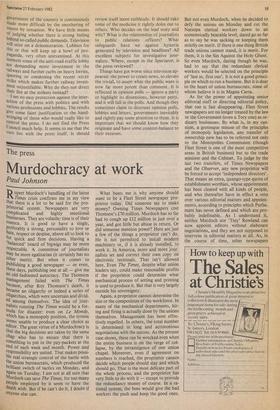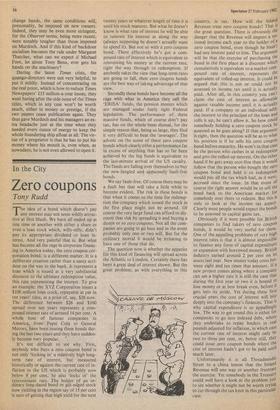The press
Murdochracy at work
Paul Johnson
Rupert Murdoch's handling of the latest Times crisis confirms me in my view that there is a lot to be said for the pro- Pnetorial system. Newspapers are very complicated and highly emotional businesses. They are volatile; time is of their essence. It is good to have a single, Preferably a strong, personality to love or hate, respect or despise, above all to look to for quick and firm decisions. Having a balanced' board of bigwigs may be more respectable. A committee of journalists May be more egalitarian (it certainly has no other merit). But when it comes to Publishing a good newspaper — or even, these days, publishing one at all — give me an old-fashioned autocracy. The Thomson Management failed with The Times because, after Roy Thomson's death, it became an oligarchy or indeed a series of oligarchies, which were uncertain and divid- ed among themselves. The idea of jour- nalists running The Times would be a for- mula for disaster: even on Le Monde, which has a monopoly position, the system seems unable to produce a clear choice as editor. The great virtue of a Murdochracy is that the big decisions are taken by the same Chap who has to ensure that there is something to put in the pay-packets at the end of each week and month. Power and responsibility are united. That makes possi- ble real strategic control of the battle with the union bureaucrats, which produced the brilliant switch of tactics on Monday, and again on Tuesday. I am not at all sure that Murdoch can save The Times, for too many People employed by it seem to have the death wish. But if he can't do it, I doubt if anyone else can. What beats me is why anyone should want to be a Fleet Street newspaper pro- prietor today. Did someone say to make money? Owning Times Newspapers cost Thomson's £70 million. Murdoch has so far had to cough up £12 million in just over a year, and got little but abuse in return. Or did someone mention power? Here are just a few of the things a proprietor can't do. He is not permitted to install modem machinery or, if it is already installed, to work it. In America, more and more jour- nalists set and correct their own copy on electronic terminals. That isn't allowed here. Even The Times, despite what union leaders say, could make reasonable profits if the proprietor could determine what mechanical process of setting and printing is used to produce it. But that is very largely outside his sovereignty.
Again, a proprietor cannot determine the size or the composition of the workforce. In many of the mechanical departments, hir- ing and firing is actually done by the unions themselves. Management has been effec- tively expelled. In others, the total number is determined in long and acrimonious negotiations with the unions. As the present case shows, these can be wrecked even when the entire business is on the verge of col- lapse, by the intransigence of one union chapel. Moreover, even if agreement on numbers is reached, the proprietor cannot decide which people should stay and which should go. That is the most delicate part of the whole process, and the proprietor has very little to do with it — except to provide the redundancy money of course. In a ra- tional system, the boss would give the bad workers the push and keep the good ones. But not even Murdoch, when he decided to defy the unions on Monday and cut the Natsopa clerical workers down to an economically bearable level, dared go so far as to say he was sacking or keeping them strictly on merit. If there is one thing British trade unions cannot stand, it is merit. For them, it is the Sin Against the Holy Ghost. So even Murdoch, daring though he was, had to say that the redundant clerical workers would be selected on the principle of 'last in, first out'. It is not a good princi- ple on which to run a business. But it is dear to the heart of union bureaucrats, some of whom believe it is in Magna Carta.
As for the power of appointing senior editorial staff or directing editorial policy, that too is fast disappearing. Fleet Street newspapers are no longer treated by the law or the Government (even a Tory one) as or- dinary businesses. By what is, in my opi- nion, a grotesque misuse of the principles of monopoly legislation, any transfer of ownership now has to be referred not only to the Monopolies Commission (though Fleet Street is one of the most competitive areas in British business) but to the trade minister and the Cabinet. To judge by the last two transfers, of Times Newspapers and the Observer, any new proprietor will be forced to accept 'independent directors'. That means an extra, quango-type quota of establishment worthies, whose appointment has been cleared with all kinds of people, and who thereafter have in effect a veto over various editorial matters and appoint- ments, according to principles which Parlia- ment has never defined and which are pro- bably indefinable. As I understand it, neither Murdoch nor 'Tiny' Rowland can now appoint editors without elaborate negotiations, and they are not supposed to intervene in editorial matters at all. As, in the course of time, other newspapers change hands, the same conditions will, presumably, be imposed on new owners. Indeed, they may be even more stringent, for the Observer terms, being more recent, were notably tougher than those imposed on Murdoch. And if this kind of backdoor socialism becomes the rule under Margaret Thatcher, what can we expect if Michael Foot, let alone Tony Benn, ever gets his hands on the machinery?
During the latest Times crisis, the quango-directors were not very helpful, to put it mildly. Instead of concentrating on the real point, which is how to reduce Times Newspapers' £15 million-a-year losses, they went haring after the side-issue of the Times titles, which in any case won't be worth much, either in money or prestige, if the two papers cease publication again. They thus gave Murdoch and his managers an ex- tra headache just at the time when they, needed every ounce of energy to keep the whole foundering ship afloat at all. The vir- tue of a proprietor is that he has to put his money where his mouth is, even when, as nowadays, he is not even allowed to open it.





































 Previous page
Previous page